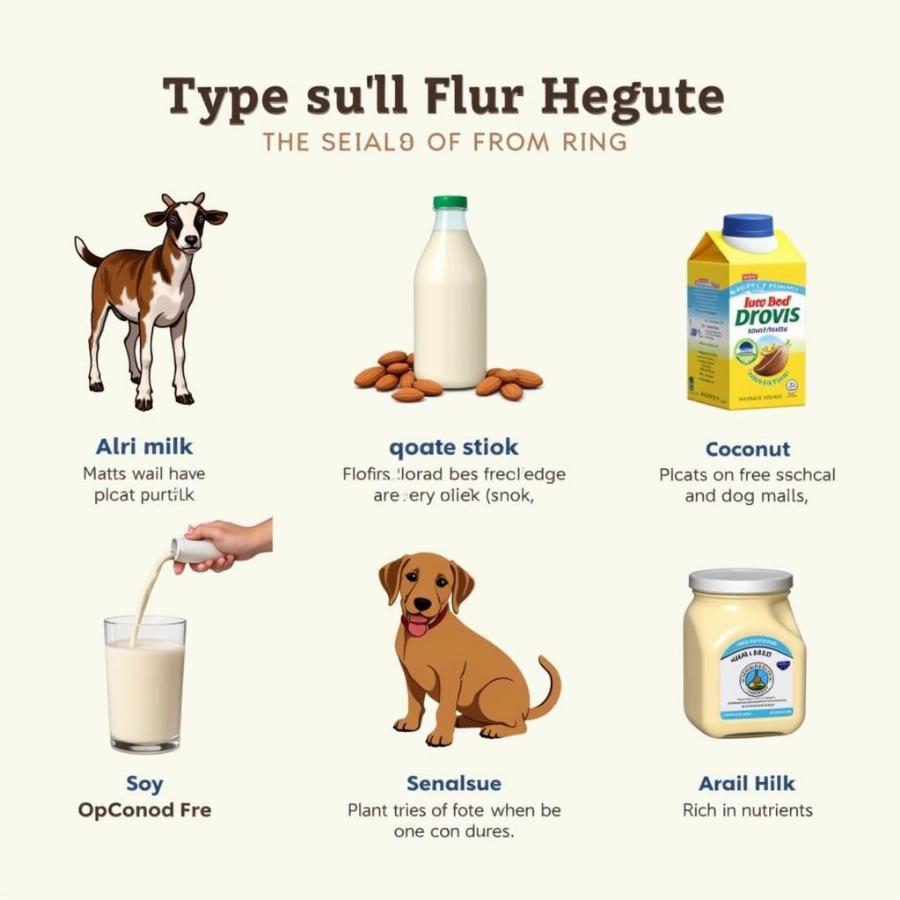Milk. It’s the quintessential drink for mammals, right? But what about our canine companions? Can dogs drink milk? The short answer is: it’s complicated. While a small amount of cow’s milk might not cause immediate harm, it’s not the best milk for dogs and can lead to digestive upset in many pups. This article delves into the world of dog-friendly milk alternatives, helping you navigate the options and choose the best milk for your furry friend.
What Kind of Milk is Best for Dogs?
Not all milk is created equal, especially when it comes to our four-legged friends. Cow’s milk, while a staple in many human diets, often contains lactose, which many dogs struggle to digest. This can lead to diarrhea, gas, and other unpleasant tummy troubles. So, what’s the solution? Luckily, there are several excellent milk alternatives specifically designed for dogs. These options are typically lactose-free and packed with nutrients to support your dog’s health.
Lactose-Free Milk Options for Dogs
- Goat’s milk: Naturally lower in lactose than cow’s milk, goat’s milk is often easier on a dog’s digestive system. It also boasts a unique nutritional profile, rich in essential fatty acids and vitamins.
- Plant-based milk: Almond, soy, coconut, and oat milk are all plant-based alternatives that are typically lactose-free. Be sure to choose unsweetened varieties and avoid those with added flavors or artificial sweeteners, which can be harmful to dogs.
- Dog-specific milk: Several brands now offer milk specifically formulated for dogs. These products are designed to be easily digestible and often fortified with added vitamins and minerals to support overall health.
 Best Milk for Dogs
Best Milk for Dogs
Can Puppies Drink Milk?
Puppies, like human babies, receive essential nutrients from their mother’s milk. This milk is specifically formulated to meet their developmental needs. Once weaned, puppies should transition to solid food and water. While a small amount of dog-specific milk can be offered as a treat, it shouldn’t replace their primary source of nutrition.
What Happens if a Dog Drinks Spoiled Milk?
Just as with humans, spoiled milk can cause digestive upset in dogs, leading to vomiting and diarrhea. It’s crucial to always check the expiration date and ensure any milk you offer your dog is fresh.
Is Almond Milk Good for Dogs?
Unsweetened almond milk can be a safe and healthy treat for dogs in moderation. It’s low in calories and lactose-free, making it a good choice for dogs with sensitive stomachs. However, always opt for plain, unsweetened varieties and avoid flavored almond milks, which can contain artificial sweeteners that are harmful to dogs.
Choosing the Right Milk for Your Dog
Choosing the best milk for dogs depends on their individual needs and preferences. Consider your dog’s age, size, and any existing health conditions. If you’re unsure which milk is best, consult your veterinarian. They can provide personalized recommendations based on your dog’s specific needs.
Can Dogs Drink Regular Milk? What are the Alternatives?
While small amounts of cow’s milk are unlikely to be fatally toxic, it’s generally not recommended for regular consumption. Many dogs are lactose intolerant, meaning they lack the enzyme needed to break down lactose. This can lead to digestive issues like diarrhea and vomiting. Alternatives like goat’s milk, plant-based milk (almond, soy, coconut, oat), and dog-specific milk offer safer and healthier options.
Conclusion
Finding the best milk for dogs requires careful consideration. While cow’s milk isn’t the ideal choice, there are many excellent alternatives available. By understanding your dog’s individual needs and exploring the options, you can ensure your furry friend enjoys a healthy and happy life.
FAQ
- Can I give my dog milk every day? While a small amount of dog-friendly milk can be offered occasionally, it shouldn’t be a daily staple in their diet.
- What are the signs of lactose intolerance in dogs? Common signs include diarrhea, gas, vomiting, and abdominal discomfort.
- Is it safe for puppies to drink cow’s milk? No, puppies should ideally receive their mother’s milk or a specially formulated puppy milk replacer. Cow’s milk can cause digestive upset.
- Can I make my own dog milk? While possible, it’s often easier and safer to opt for commercially available dog-friendly milk alternatives.
- How much milk can I give my dog? Start with a small amount and monitor your dog for any adverse reactions. Consult your veterinarian for specific recommendations based on your dog’s size and breed.
- Are there any benefits to giving my dog milk? Dog-specific milk can provide added vitamins and minerals, while goat’s milk is rich in essential fatty acids.
- What should I do if my dog has a bad reaction to milk? Discontinue offering milk and consult your veterinarian if symptoms persist.
Beaut Dogs is your trusted source for all things dog-related. We provide expert advice, helpful resources, and a passionate community of dog lovers. For personalized guidance on choosing the best milk for your dog, contact us at Email: [email protected]. Beaut Dogs is committed to helping you provide the best possible care for your canine companion.